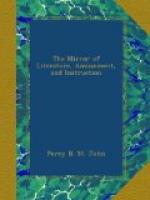Yet if when sleep the body
chains
In sweet oblivion of its pains,
Thou bid’st imagination active wake,
Oh, Morpheus! banish from
my bed
Each form of grief, each form
of dread,
And all that can the soul with horror
shake:
Let not the ghastly fiends admission find,
Which conscience forms to haunt the guilty
mind—
Oh! let not forms like these my
peaceful slumbers break!
But bring before my raptured
sight
Each pleasing image of delight,
Of love, of friendship, and of social
joy;
And chiefly, on thy magic
wing
My ever blooming Mary bring,
(Whose beauties all my waking thoughts
employ,)
Glowing with rosy health and every charm
That knows to fill my breast with soft
alarm,
Oh, bring the gentle maiden to my fancy’s
eye!
Not such, as oft my jealous
fear
Hath bid the lovely girl appear,
Deaf to my vows, by my complaints unmov’d,
Whilst to my happier rival’s
prayer,
Smiling, she turns a willing
ear,
And gives the bliss supreme to be belov’d:
Oh, sleep dispensing power! such thoughts
restrain,
Nor e’en in dreams inflict the bitter
pain,
To know my vows are scorn’d—my
rivals are approv’d!
Ah, no! let fancy’s
hand supply
The blushing cheek, the melting
eye,
The heaving breast which glows with genial
fire;
Then let me clasp her in my
arms,
And, basking in her sweetest
charms,
Lose every grief in that triumphant hour.
If Morpheus, thus thou’lt cheat
the gloomy night,
For thy embrace I’ll fly day’s
garish light,
Nor ever wish to wake while dreams like
this inspire!
HUGH DELMORE.
* * * * *
ON IDLENESS.
(For the Mirror.)
It has been somewhere asserted, that “no one is idle who can do any thing. It is conscious inability, or the sense of repeated failures, that prevents us from undertaking, or deters us from the prosecution of any work.” In answer to this it may be said, that men of very great natural genius are in general exempt from a love of idleness, because, being pushed forward, as it were, and excited to action by that vis vivida, which is continually stirring within them, the first effort, the original impetus, proceeds not altogether from their own voluntary exertion, and because the pleasure which they, above all others, experience in the exercise of their faculties, is an ample compensation for the labour which that exercise requires. Accordingly, we find that the best writers of every age have generally, though not always, been the most voluminous. Not to mention a host of ancients, I might instance many of our own country as illustrious examples of this assertion, and no example more illustrious than that of the immortal Shakspeare. In our times the




